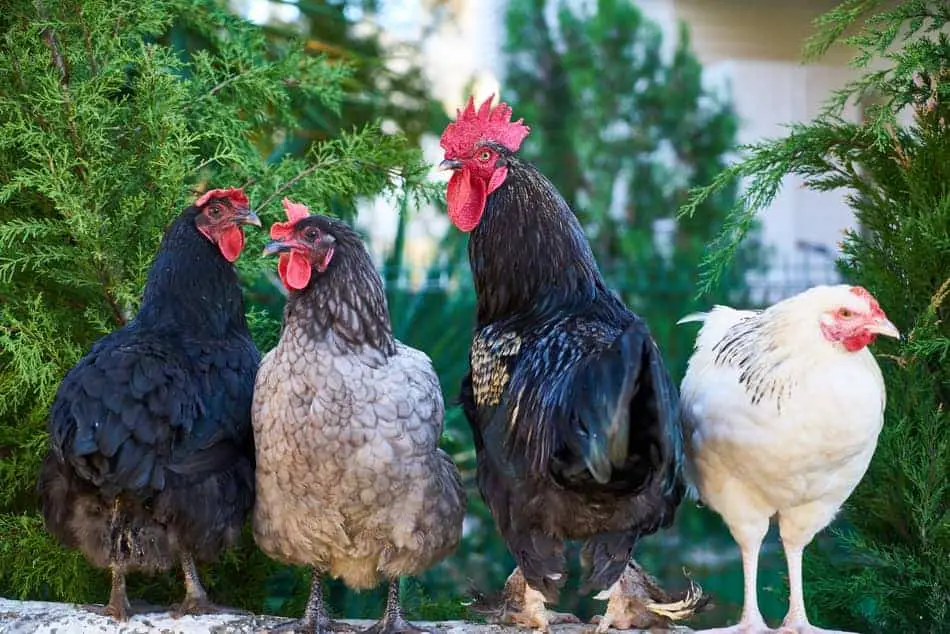
Who doesn’t want fresh eggs (vegans excluded)? The benefits and delicious tasted of fresh, free range, backyard chicken eggs has been extolled on television, magazines and on the web to the point where you just need to have some.
Assuming that backyard chickens are allowed by your municipality (and they aren’t in mine! Check your local by-laws) the question of how much of a problem they will be to you and your neighbors always pops up. You will run the risk of rodents (my wife always says – where there are chickens, there are rats) and other pests, plus the considerations of smell, but what we want to consider today is how much of an audible distraction are they for you and the hood? How noisy are backyard chickens? I went looking around the Interwebs to find out.
So how noisy are chickens? It can vary by breed, but many chickens are quiet throughout the day, peaking in the morning when they first need to be let out or have just laid an egg. Hens typically peak around 60-70 decibels (approximately the same as a human conversation) and roosters around 90 decibels (similar to a barking dog).
Let’s go into a little more detail.
Looking for a chicken coop? Check out this selection at Amazon
The Typical Backyard Chicken
Backyard chickens are becoming more a more popular – and not just for the eggs but also for their value as a family pet. One of the big concerns that many people have before decided to get backyard chickens is the amount of noise that they are going to be making and if they are going to disturb their neighbors. Urban and suburban lots are not very big and a lot of continuous noise can definitely cause a rift between neighbors – especially if you don’t have a good relationship with yours already.
The good news is that most backyard hens are relatively quiet – more so than the dog that you neighbor might already have – most of the time. Hens (the female, of course) can make greater amounts of noise early in the morning when they are looking to get out of their coops, and again when they have laid an egg. This is often called the “egg song” and will be something of a triumphant squawk.
Hens can also make a large amount of noise when they are in danger or believe that they are in danger. The good news about this kind of noise is that it will end as soon as the danger or perceived danger is removed or resolved.
Roosters are a different matter entirely and will be more noisy early, during the day, evening, and overnight with the expected rooster crowing. Many people report that a rooster will also stir up the hens, making everyone noisier.
Each chicken and each flock will be a little different.
Roosters
If you have a problem with noise, it’s more than likely going to come from having a rooster. Rooster noise problems are so prevalent that most municipalities have placed a ban on keeping roosters as backyard chickens.
Roosters don’t just crow in the morning – they will crow at any time of day. You might hear the first crow at 4:30 am when he decides it’s time for everyone to get up, and you might hear the last after the sun goes down for the night.
A rooster crow will reach 90 decibels – about the same as a dog bark – and while it’s not constant, it’s likely going to be the loudest noise you hear out of a chicken.
If you are interested in having a rooster in order to breed some of your hens, it turns out that you’ll only need one for a few days. Instead of keeping one permanently you may be able to borrow one for a week, let him loose on your coop, and reap the rewards after he’s gone back to his permanent home.
Morning Noises
With hens, most of the noise that you’ll hear comes in the morning. In the early hours (just after the sun starts rising) the hens will want to get moving to starting the day. This will mean getting out of their coop and into the run so they can start foraging, and they don’t particularly care that you would prefer to sleep in a little. The noises that they’ll make at this time are more of a whining growl or cry than the noises you’d expect from a chicken and can continue on and off until they have laid an egg (or their first egg if they lay more than one a day.
Speaking of laying an egg – hens can be awfully proud of their eggs. Some hens and some breeds will announce their victory to the world with an “egg song.” While this typically comes around the time an egg is being laid by the particular chicken, it can also come before or after. Sometimes part of all of the rest of the flock will join in – kind of like an egg song chorus.
Morning noises are those that typically peak at 60-70 decibels (about a human conversation.) Some hens can generate far more noise than that, but that’s what you can expect from your average hen.
Noise Throughout the Rest of the Day
Once the morning noises are complete the hens will settle down for the rest of the day. They will continue to make soft noises now and then – the typical clucking noises are common for chickens that are content while the forage. These clucking noises are much quieter than what the hens produce in the morning, and not something you’re likely to hear from too far away.
Hens can become excited and make a little more noise from time to time – especially if you’ve got them trained to be excited when they see you. If you’re always bringing treat you’ll likely see them squawk loudly and run towards you whenever you show yourself in the back yard.
Danger Noises – The Alarm Call
The more uncommon but potentially loudest noise you’ll hear from a hen is the call they make when they are scared, startled, or in danger. This noise will be to alert the flock that they need to take cover, so needs to be loud enough to cover a large area.
Your chickens could make this call for a danger that’s either real or perceived. It could be a predator like a hawk or fox (or even cat), it could be a perceived danger like a loud noise.
Danger noises will typically end as soon as the danger or perceived danger is removed. If it’s a predator animal, when the animal moves on the chickens will settle down. If they have scared themselves they will typically calm down if you pop out to visit them.
Noise From Different Chicken Breeds
As it turns out, there are a large number of breeds of chickens and some breeds of chicken are quieter than others. There are lots of recommendations out there on which kind of chicken to get that will be quieter in your backyard. Two common recommendations for backyard chickens are:
- Australorps. The Australorp is a breed of Australian origin that is reputed to be a quieter breed, very family friendly, and very good egg layers. They are typically black in color and about 3kg.
- Rhode Island Reds. The Rhode Island Red is an American breed is another quiet and family-friendly bird that is a very good egg layer. They typically deep red/brown plumage and also weigh about 3kg.
There are many breeds that will be quieter and some that will be louder. Easter Eggers are a breed that I’ve come across as potentially being quite loud, although they are popular due to the variety of colors of eggs they can lay.
How To Deal With Chicken Noises and Neighbors
Given everything above, if you do need to deal with having both neighbors and chickens, we have a few suggestions for you. Given how quiet some chickens can be, your neighbors may never even know you have hens in the backyard, but it’s always worth being a good neighbor.
- Talk to your neighbors. IF you can – before you get your first hen be sure to have a conversation to understand how your neighbors feels about having chickens next door. If your by-law allows it, they probably can’t stop you – but it’s better to have the air cleared before you start.
- Stay away from the roosters. As discussed above, the roosters will be the biggest cause of noise throughout the day (and night!) If you’re concerned about noise and your neighbors, don’t get a rooster.
- Stick with quieter breeds. The less noise that your chicken makes, the less likely there will be an issues.
- Keep chickens responsibly! This means getting up early and letting them out before they start complaining too much about being in the coop. It also means going out to save them if they’ve scared themselves or have been scared by others.
- Manage the noisy bird. While it may not be popular (and you may love your chicken) – if it’s one bird that causing all the trouble you may need to deal with it. This could be rehoming the bird – or (and not to sound cold-hearted) something more or less savory.
- Share the wealth. Make sure that you provide some of those fresh eggs to your neighbors so they can also enjoy the great taste and excellent nutrition. This can even be just the extras, but a little goes a long way.
Some neighbors will actually enjoy hearing the chickens next door. Researching this article I got a chance to listen to a good number of chickens, and their cooing and contented noises are quite soothing. In general, the right backyard chickens will not be too much of a bother to those around you.

